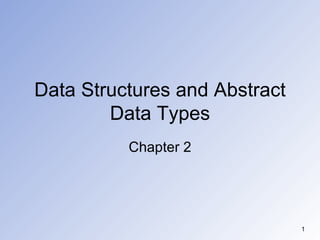
Lec2&3_DataStructure
- 1. Data Structures and Abstract Data Types Chapter 2
- 6. C++ Data Types structured array struct union class simple integral enum char short int long bool address pointer reference floating float double long double
- 27. Example with Array Parameters #include <iomanip> #include <iostream> void Obtain (int[], int); // Prototypes here void FindWarmest ( const int[], int , int&); void FindAverage ( const int[], int , int&); void Print ( const int[], int); using namespace std; int main ( ) { // Array to hold up to 31 temperatures int temp[31] int numDays; int average; int hottest; int m;
- 28. Example continued cout << “How many daily temperatures? ”; cin >> numDays; Obtain(temp, numDays); // Call passes value of numDays and address temp cout << numDays << “ temperatures“ << endl; Print (temp, numDays); FindAverage (temp, numDays, average); FindWarmest (temp, numDays, hottest); cout << endl << “Average was: “ << average << endl; cout << “Highest was: “ << hottest << endl; return 0; }
- 29. Memory Allocated for Array int temp[31]; // Array to hold up to 31 temperatures temp[0] temp[1] temp[2] temp[3] temp[4] . . . . . temp[30] 6000 Base Address 50 65 70 62 68 . . . . . .
- 30. void Obtain ( /* out */ int temp[] , /* in */ int number ) // User enters number temperatures at keyboard // Precondition: // number is assigned && number > 0 // Postcondition: // temp[0 . . number -1] are assigned { int m; for (m = 0; m < number; m++) { cout << “Enter a temperature : “; cin >> temp[m]; } }
- 31. void Print ( /* in */ const int temp[], /* in */ int number ) // Prints number temperature values to screen // Precondition: // number is assigned && number > 0 // temp[0 . . number -1] are assigned // Postcondition: // temp[0 . . number -1] printed 5 per line { int m; cout << “You entered: “; for (m = 0; m < number; m++) { if (m % 5 == 0) cout << endl; cout << setw(7) << temp[m]; } }
- 34. Figure 2: Array Input Function #include <cassert> void read(IntArray theArray, int capacity, int numValues) /*------------------------------------------------------------------------- Input values into an array of integers from the keyboard. Preconditions: 0 <= numValues < capacity, which is the capacity of theArray. Postcondition: numValues integers entered from the keyboard have been stored in the first NumValues positions of theArray -------------------------------------------------------------------------/* { assert (numValues >= 0 && numValues <= capacity); for (int i = 0; i < numValues; i++) cin » theArray[i] ; }
- 35. #include <iostream> using namespace std; void main() { int Nums[4]; int Sum=0; cout<<"Enter 4 Numbers :"; for(int i=0;i<4;i++) cin>>Nums[i]; for(int j=0;j<4;j++) Sum+=Nums[j]; cout<<"Sum = "<<Sum<<endl; }
